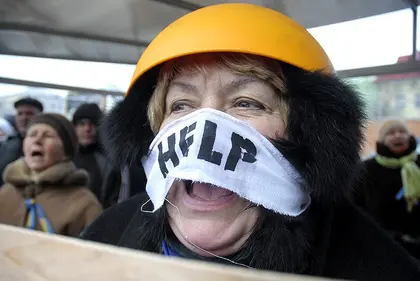Speaking to journalists at the Ukraine Crisis Media Center, Pashinski said the first goal of the operation is to “fully blockade the city of Sloviansk” in Donetsk Oblast.
Separatist violence has spread throughout Ukraine’s eastern regions since April 6, when Russian-backed rebels began seizing government buildings in Donetsk, Kharkiv, and Luhansk Oblasts.
JOIN US ON TELEGRAM
Follow our coverage of the war on the @Kyivpost_official.
The Ukrainian government has been heretofore been unable to quell the separatist movements. On April 25, a separatists fired a rocket-propelled grenade at a Ukrainian helicopter at an airfield outside the Donetsk Oblast city of Kramatorsk, destroying the helicopter and injuring the pilot.
The inability of the Ukrainian government to defend its citizens in the east has prompted many U.S. officials to suggest providing lethal aid to Ukraine’s armed forces.
Also speaking at the Ukraine Crisis Media Center on April 25, U.S. Senator Carl Levin (D-MI) said he supports providing weapons and ammunition to Ukraine: “If they need them, we should provide them. I would support that.”
He also said the U.S. should begin sending fuel and body armor to bolster the Ukrainian military’s capability, a concept known as “force equalizer.”
Levin, the Chairman of the Senate Committee on Armed Services, joined a chorus of U.S. lawmakers in calling for lethal aid to be sent to help secure Ukraine’s border with Russia.
In an April 22 interview on the Charlie Rose Show, Senator John McCain (R-AZ) said that the U.S. should provide Ukraine with light arms, anti-tank, and anti-aircraft weapons, calling Russian President Vladimir Putin’s actions in eastern Ukraine “eerily similar” to those of Adolf Hitler.
When asked about the possibility of receiving lethal aid from the U.S. at a briefing at the Carnegie Endowment for International Peace on April 24, Ukraine’s deputy Foreign Minister Danylo Lubkivsky said that Ukraine “would definitely be interested to gain all necessary means to protect our country.”
According to a White House fact sheet, the U.S. is already providing non-lethal aid to the Ukrainian military, including “Explosive Ordnance Disposal equipment and handheld radios for Ukraine’s Armed Forces…Engineering equipment, communications equipment, vehicles, and non-lethal individual tactical gear for Ukraine’s Border Guard Service.”
Additionally, the U.S. is providing $3 million worth of ready-to-eat meals and almost $7 million in “health and welfare assistance.”
Although Levin emphasized that targeting Russian officials and banks with sanctions would be the best way to deter Putin’s aggression, many believe that arming Ukraine is the only way to reinforce Ukraine’s sovereignty.
Indeed, although sanctions from the U.S. and EU have dealt a powerful blow to the Russian economy, Putin has shown few signs that his appetite for recovering lands that the Russian empire once controlled has been satiated. In fact, Putin has denied the existence of Ukraine as a nation and has referred to the Crimean peninsula, which Russia invaded and annexed in Feburary-March, “as always being Russian.” He has furthermore used an archaic imperialistic term when referring to the regions that comprise eastern Ukraine.
Experts believe that sanctions could lead to as much as $160 billion dollars in capital flight from Russia in 2014 alone. The Russian ruble, and Moscow’s stock index, the MICEX, have fallen precipitously since Russia began its invasion of Crimea at the end of February.
Yet as the Russian economy has slowed, Putin’s popularity has soared. In mid-March, Putin’s popularity stood at 72 percent, up 10 percent from earlier in the year, according to a poll conducted by Russia’s state polling service VTsIOM.
This suggests that merely sanctioning Russian officials and banks may not make Putin blink. On the contrary, he may be emboldened to seize large swaths of Ukrainian territory to compensate for a sputtering economy.
Still, the U.S. will likely enact a third round of sanctions soon. This would entail sector-wide sanctions in banking, mining, and energy, among others, that would impact the global economy, but would disproportionately hit Russia. American President Barack Obama said on April 24 that if Putin refuses to stand down, he should expect, “consequences,” saying that the U.S. has a fresh round of sanctions “teed up.”
U.S. Secretary of State John Kerry made similar threats: “If Russia chooses the path of de-escalation, the international community – all of us – will welcome it. If Russia does not, the world will make sure that the cost for Russia will only grow” said Kerry in a speech on April 24.
Levin said that the U.S. should not be afraid to target the largest and most important drivers of the Russian economy, including Gazprom, the state-controlled energy giant.
Concluding his remarks, he said the U.S. should be prepared to deal with its own economic setbacks as a result of sanctioning the Russian energy sector.
“We in America may be paying higher prices as a result” of sanctioning Russia. “But all of us must decide: would we rather pay a higher price for energy…or see a war take a much higher price?” said Levin.
Kyiv Post staff writer Isaac Webb can be reached at @isaacdwebb or isaac.d.webb@gmail.com.
You can also highlight the text and press Ctrl + Enter




